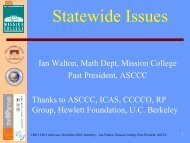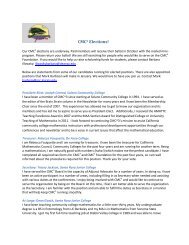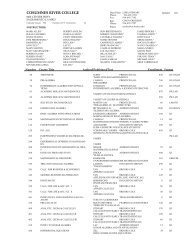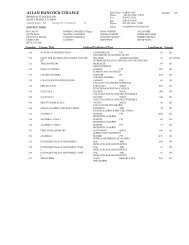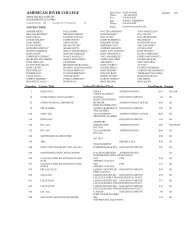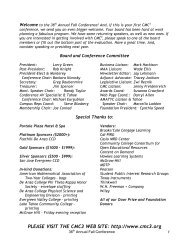Bonsai II - California Mathematics Council Community Colleges
Bonsai II - California Mathematics Council Community Colleges
Bonsai II - California Mathematics Council Community Colleges
You also want an ePaper? Increase the reach of your titles
YUMPU automatically turns print PDFs into web optimized ePapers that Google loves.
7:30 am Estimation Walk/Run meet in the Lobby <br />
8:15 -‐ 10:00 am Registration De Anza I <br />
8:30 am -‐ 1:00 pm Exhibits open De Anza I <br />
Mark Clark <br />
Palomar College <br />
MClark@palomar.edu <br />
<strong>Bonsai</strong> <strong>II</strong> <br />
(General Interest) <br />
Encouraging Critical Thinking and Communication in Developmental Math<br />
How can we challenge our students to understand the meaning of math within real-world applications<br />
How can we make students think and write more and look at results critically<br />
This talk will focus on practical techniques and activities that help students connect the concepts<br />
to the skills being taught.<br />
Kathleen Almy and Heather Foes <br />
CONFERENCE PROGRAM -‐ SATURDAY <br />
First Session: 9:00 -‐ 10:00 am <br />
Rock Valley College (Rockford, IL) <br />
KathleenAlmy@gmail.com and Heather.Foes@gmail.com <br />
<strong>Bonsai</strong> <strong>II</strong>I <br />
New Pathways for Developmental Math:<br />
A Look into Mathematical Literacy for College Students<br />
(Developmental Ed.) <br />
Mathematical Literacy for College Students (MLCS) is a new course that is part of an AMATYC initiative called<br />
"New Life for Developmental Math", as well as the Carnegie Quantway project. It is an innovative way to redesign the<br />
developmental curriculum, providing pathways for the non-STEM student.<br />
In one semester, a student placing into beginning algebra will gain the mathematical maturity to be successful in a<br />
statistics or liberal arts math course. Attendees will learn much more about the course as well as receive ideas for<br />
course development including a sample course outline and a sample lesson.<br />
Sherri Messersmith , Robert Feldman , Larry Perez <br />
College of DuPage , U. Mass. Amherst , Saddleback College <br />
Sherri.Messersmith@gmail.com ; Feldman@sbs.umass.edu ; LPerez@saddleback.edu <br />
Portola <br />
(Panels/Issues) <br />
FULLY INTEGRATE Study Skills in Your Classroom Using P.O.W.E.R.<br />
How can we truly help students learn the “other” skills they need to be successful in our classes Use P.O.W.E.R.<br />
We will discuss how to use the scientifically-based P.O.W.E.R. framework in the math classroom in a truly integrated<br />
way to teach students study skills as they are learning mathematics.<br />
George Woodbury <br />
Redwood <strong>II</strong> <br />
College of the Sequoias <br />
(Technology) <br />
GeorgeW@cos.edu <br />
Mastery Learning and Elements of Game Design in Your Math Course<br />
The incorporation of mastery learning and ideas from game design can increase students’ chances for success<br />
in your mathematics class. The speaker will share ways to incorporate mastery learning into your courses,<br />
and discuss the benefits of incorporating game design elements. Data from several classes will be shared.<br />
40 th Annual Fall Conference 6



